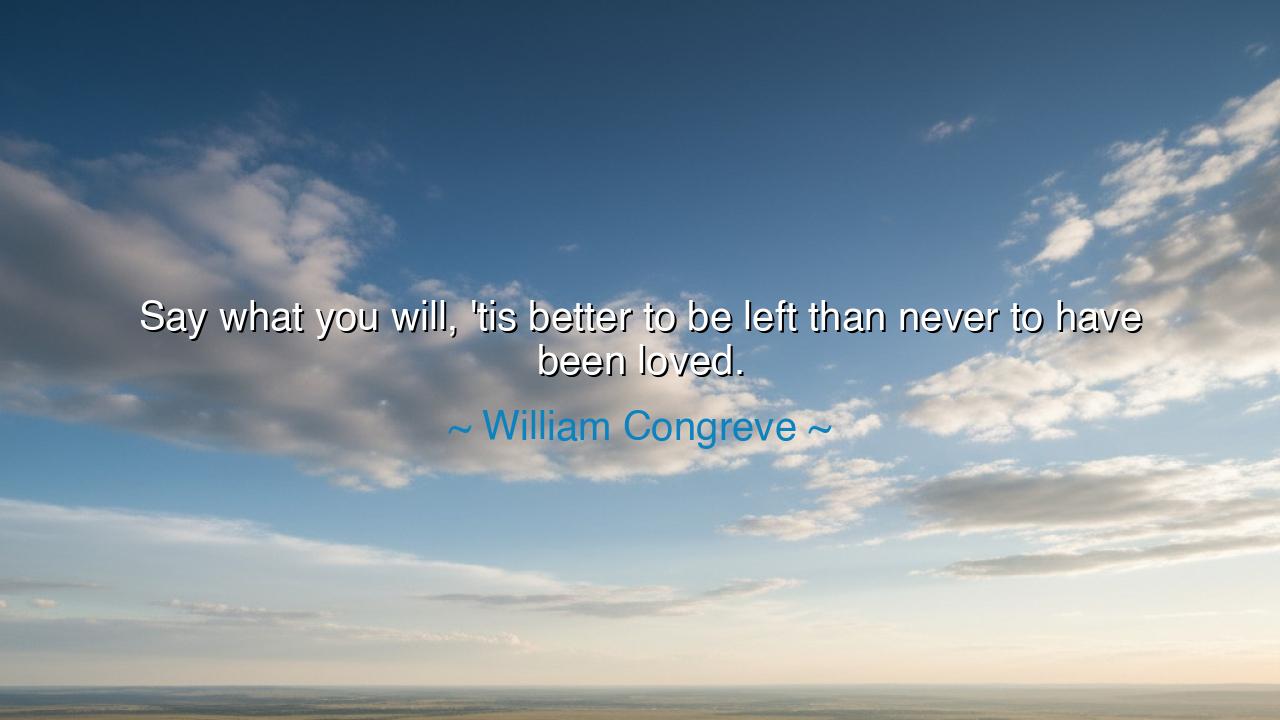
Say what you will, 'tis better to be left than never to have been






"Say what you will, 'tis better to be left than never to have been loved." These words, spoken by the esteemed playwright William Congreve, offer a powerful reflection on the nature of love and its significance in the human experience. In a world where love can bring both joy and pain, Congreve speaks to the truth that the act of loving, even when it leads to heartache or separation, is still preferable to the absence of love altogether. To have known love, to have felt its warmth, and to have experienced the connection it brings, is to have lived a life filled with meaning, regardless of the challenges it may bring. Love, though fleeting at times, enriches our souls in ways that isolation and indifference never could.
In the wisdom of the ancients, love was viewed as the most sacred force in human existence, one that not only binds people together but elevates them beyond the mundane. The Greeks celebrated love in many forms: Eros, the god of passionate love, and Agape, the selfless love that connects all humanity. But perhaps the most important lesson was that love, in any form, was an essential part of life. Aristotle, in his Nicomachean Ethics, defined love as an essential element of flourishing, without which life would be empty and incomplete. According to Aristotle, to live a good life, one must cultivate genuine relationships founded in love, for love enables individuals to reach their highest potential and experience true happiness.
Consider the great story of Pyramus and Thisbe, a tale from ancient Babylon that beautifully illustrates the power and the inevitability of love. In this tragic love story, the two lovers are separated by a wall, unable to be together due to their families' animosity. Yet their love transcends the barrier, and they communicate through whispers and gestures. When fate tragically separates them through misunderstanding and death, the story ends in sorrow, but it is a sorrow imbued with the fullness of their love. They may have been torn apart, but they experienced the depth of love—something far greater than the emptiness of never having loved at all. This ancient tale echoes Congreve's sentiment, showing us that the experience of love, even when fraught with pain, is better than the cold void of never having known it.
Similarly, in the life of Antony and Cleopatra, we see the immense power of love and the suffering that can accompany it. Their love, marked by passion and political intrigue, led to their ultimate downfall, yet it was a love that transcended the battles and the empires they were entangled in. Though they were betrayed, they also loved deeply, and their love remained immortalized throughout history. Cleopatra, having loved Antony and been loved in return, experienced a richness of life that would have been denied to her had she chosen to remain untouched by love’s powerful hand. In this sense, Congreve’s quote finds deep resonance in their story: it is better to have loved, even if it leads to loss, than to never have known that depth of connection at all.
Congreve’s words reflect a fundamental truth about the human experience: love, despite its occasional pain, is the vibrancy that makes life worth living. We often fear the suffering that accompanies love—rejection, heartbreak, loss—but love gives us a purpose, an intensity, and a fulfillment that cannot be found in the absence of emotion. The joy of truly loving and being loved outweighs the suffering that may come from separation, for it is through love that we experience the fullness of our humanity. Even in the darkest moments, the fact that we have loved gives us a sense of wholeness, a richness that the untouched soul can never comprehend.
The lesson Congreve offers us is one of acceptance and gratitude for love, even in its transient nature. The human experience is not defined by permanence but by the intensity of connection we share with others. Love may not last forever, but its impact on our hearts is everlasting. The beauty of love lies not in its duration, but in its ability to transform us, to help us grow, and to give us a sense of meaning that transcends the fleeting nature of life itself. To have loved, even if it means facing heartache, is better than living a life without ever knowing the depth and transformative power of love.
In your own life, reflect on your experiences with love. Are you willing to open your heart, even knowing that love can sometimes bring pain? Love fully, without hesitation, knowing that the depth of the connection you share with others will give your life meaning and purpose, regardless of the challenges you may face. Embrace love, whether it brings joy or sorrow, because in the end, it is better to have loved than to have lived without experiencing the transformative power of true affection. Love gives us the courage to be vulnerable, to give and receive freely, and to understand that in loving, we become more complete, more alive, and more attuned to the richness of the human experience.






AAdministratorAdministrator
Welcome, honored guests. Please leave a comment, we will respond soon